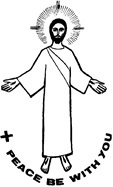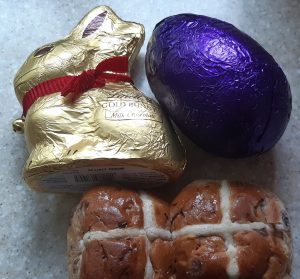Easter 4 – Spiritual Gifts?
Acts 9:36 – end and John 10: 22-30
Do we ever wonder why we do certain things? Often we find out later what God’s plan was in asking us to make a phone call or visit a friend. The story from Acts is one in which we can see God’s plan in action, while the people taking part might not have been able to.
Dorcas was a needlewoman and dressmaker. She was generous with her gift and known for her generosity and so was much loved. We often feel that our skills are not included in the list of spiritual gifts that Paul lists in 1 Corinthians 12 – where he includes things such as wisdom, knowledge, prophecy and teaching. Paul had obviously only included a few of the Holy Spirit’s gifts, as it seems clear from this passage that needlework was for Dorcas a spiritual gift because she used it for God. It is possible that we have not properly understood the gifting teaching, as the more I look into it, the more I become convinced that a gift comes from the Holy Spirit to the extent that we use it for the furtherance of God’s Kingdom. If we think along those lines, then we will look at how we do things in a whole new way. If you are a regular maker of cakes for our coffee mornings, you might now look at this in a new light.
Another way of looking at this is to consider the rule of St Benedict for monastic life which has three mottoes. The first is ‘’So that God may be glorified in all things” which could be described as the reason for choosing the way of life, the second “peace”, the reward hoped for in leading the monastic life and the third is “work and pray”, and is what monks do in order to obtain the first two. We could all do worse than apply these three mottoes to our own lives, as George Herbert encourages us to do in the hymn ‘Teach me, my God and King in all things Thee to see’.
If we look back at our original question, there are actually several questions. The matter-of-fact way that the death of Dorcas is told implies that this was an occasion for sorrow, but in the ways that things were in those days, not the shock that it would have been nowadays. Illness and death were a much more common occurrence than they are nowadays, although as the reaction of those who knew her shows, still the occasion for sorrow. No reason is given for summoning Peter however. There is no suggestion that a miracle was hoped for, although the timescales indicate that her body was not buried as quickly as was customary, so perhaps they were just daring to hope. As ever, we have the advantage of knowing how the story continues. We know that Peter was not far away at Lydda – about 14 miles, so certainly he would have been there by the next day and it is possible that he was able to return with the messengers within the day. The text of the reading sounds as though he wasted no time in leaving.
It is customary, even today to visit or make contact by a phone call, email or card with a household where there has been a death, and it is possible that Peter simply intended to visit to pay his respects to a much loved friend. Could he also have been thinking though of the time when Jesus raised Lazarus, or when he witnessed the raising of Jairus’s daughter? Unfortunately Luke only tells us what people did, and not often what they thought at the time! It does seem to be the case though that Peter was following the guidance of the Holy Spirit, even if he was not aware at the time what God had in store for him. One of the things that Jesus says in our Gospel reading is ‘My sheep hear my voice. I know them, and they follow me.’ Peter had been with Jesus for long enough to know his master’s will, and he was generally careful to follow it after his catastrophic denial during Jesus’ trial. We heard last week in our gospel reading how Jesus took Peter aside after the breakfast meeting on the beach and tasked him with caring for his sheep. Those words must have stuck fast in Peter’s brain in the way that lessons learned the hard way often do.
Both of our readings today are full of questions why – why was Peter sent for, why did he go, and added to that what made him think when he arrived that Dorcas could be raised? In the gospel we are also wondering why the Jews could not see and hear from Jesus’ teaching and actions who he was. Nearly all the unanswered questions we have regarding our faith begin with why – my hope is that when we finally see God and can be in his presence, it will all suddenly become plain to us. For now, that is why we need to have faith.
What we can see from today’s story from Acts though is the way in which the Holy Spirit is at work in joining things up – bringing people to the right place at the right time. This chapter in Acts covers a lot of ground, and possibly several years, as it began with Saul setting off to destroy the church in Damascus before his dramatic meeting with Jesus on the way. He then spent time with the Damascus church before returning to Jerusalem to meet with the church leaders there, where he was initially met with suspicion until Barnabas supported him. Once he was accepted, the church appears to have entered into a period of relative peace and growth, and it was during this time that Peter seems to have travelled around the area to meet with and encourage new believers and fellowships. It was this travelling that brought him to Lydda, where he was instrumental in a healing miracle, and it was here that Dorcas’s friends found him, and summoned him to her. It could be that having heard of the recent healing they had hope for her.
At the end of this story however, we hear that Peter went to lodge with Simon the tanner. In those days tanning, which involves handling of dead animals was considered unclean to the Jews. I had a friend who lived near a tannery a while ago, and she told me that as far as she was concerned, having lived near enough to smell the chemicals, it still was unclean! However, the fact that he visited implies that Peter’s thinking was becoming more open. The story of what happened next is no doubt one that we shall be looking at soon, but it shows how the Holy Spirit is moving people around so that they can be in the right place at the time when God has work for them. As my commentary says: ‘Note how God used the invitation of the people of Joppa to bring Peter there. Likewise, God often uses what appear initially to be incidental occurrences to open up great ministries.’[1]
If we have been able to act upon reminders from God to check up on friends, only to find out afterwards that they were going through a tough time, we too will be able to look back and see the guidance of the Holy Spirit. And the next time any of us does some cleaning or needlework, makes a cake or arranges flowers, we need to remember where our gifts and skills come from and for whom we are ultimately doing the work.
[1] Constable’s notes, Copyright ©1996-2020 Bible.org, but reprinted with permission




